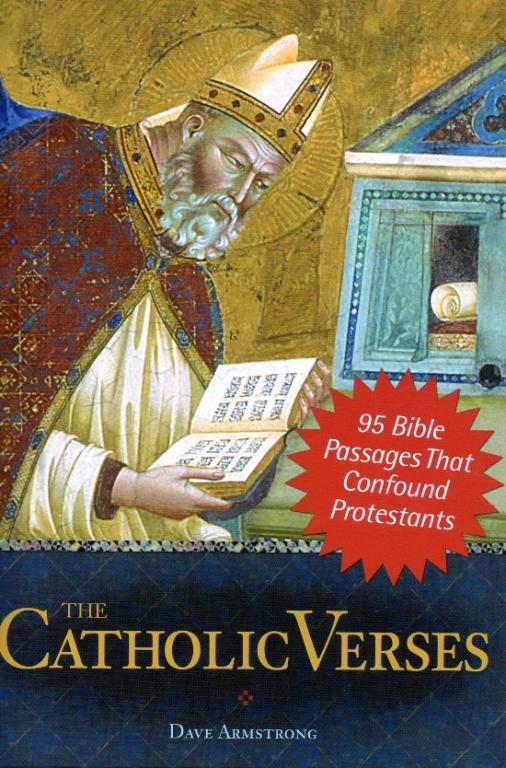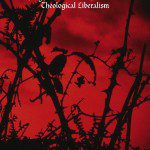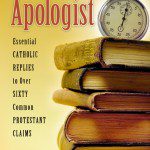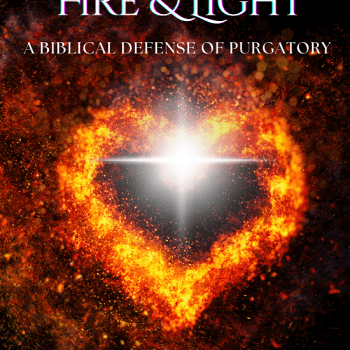[235 pages; published by Sophia Institute Press in August 2004]
—– To purchase, go to the bottom of the page —–
[cover design by Theodore Schluenderfritz]
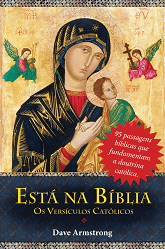
Table of Contents
[linked portions available online indicated by color]
DedicationIntroduction
1. The Church
-
- The Church is the “Pillar of the Truth”
- The Binding Authority of Councils, Led by the Holy Spirit
- The Authority of Oral Tradition
- Sinners in the Church
2. Divisions and Denominationalism
-
- Christians Ought to Be One as Jesus and His Father Are One
- A Multiplicity of Divisions Is a Bad Thing
- Dissensions and Denominationalism Forbidden by St. Paul
3. Bible and Tradition
-
- The Necessity of Authoritative Interpretation
- The Binding Authority of Tradition, According to St. Paul
- Oral and Extrabiblical Tradition in the New Testament
4. The Papacy
-
- St. Peter as the Rock and Possessor of the Keys of the Kingdom
5. Justification and Salvation
-
- Faith and Works: Two Sides of One Coin
- The Rich Young Ruler’s Question About Salvation
- God’s Fellow Workers?
- St. Paul’s Plea: “Work Out Your Salvation”
- Obedience Necessary for Salvation
- Disobedience Led to Death, Obedience to Justification
- St. Paul on Falling Away from the Faith and Salvation
- Other Biblical Writers on Apostasy
6. Judgment and Good Works
-
- The Crucial Role of Works (and Absence of Faith) in Judgment Day Accounts
- St. Paul: “Doers of the Law” Will Be Justified
7. Baptism
-
- Baptism of Entire Households (Implying the Baptism of Children) .
- Baptismal Regeneration
8. The Eucharist
-
- The Last Supper: “This Is My Body”
- “He Who Eats My Flesh and Drinks My Blood Has Eternal Life”
- “Participation” in the Body and Blood of Christ
- Profaning the Body and Blood of the Lord
9. Penance
-
- Sharing in Christ’s Sufferings
- Carrying Christ’s Afflictions in Our Bodies
10. The Communion of the Saints
-
- The Imitation of Paul and the Veneration of the Saints
- Saints in Heaven as a “Cloud of Witnesses” Watching Those on Earth
- The Intercession of the Saints and Their Connection with the Earth
11. Relics and Sacramentals
-
- Elisha’s Bones Raise a Man from the Dead
- More Biblical Relics: Elijah’s Mantle, Peter’s Shadow, and Paul’s Handkerchief
12. Purgatory and Prayers for the Dead
-
- A Fairly Explicit Biblical Argument for Purgatory
- Baptism for the Dead: the Most “Un-Protestant” Verse in the Bible
- The Case of Onesiphorus: Did St. Paul Pray for a Dead Man?
- Prayers for the Dead When the Dead Are Raised
13. The Blessed Virgin Mary
14. Clerical Celibacy
-
- Voluntary Eunuchs for the Sake of the Kingdom of Heaven
- “Each Has His Own Special Gift”; “Undivided Devotion to the Lord”
15. Divorce
-
- Our Lord Jesus’ “Strict” Stance on Divorce
16. Contraception
-
- The Sin of Onan [online excerpt is from the first draft, and contains some differences]
ConclusionBibliography
Introduction
The total of ninety-five Bible passages presented in this book – as many readers no doubt suspect – subtly makes reference to the famous Ninety-Five Theses of Martin Luther, tacked on the door of a church in Wittenberg, Germany, on October 31, 1517, in protest against certain doctrines and practices of the Catholic Church. That act is considered the beginning of what is called the Protestant Reformation.
The Catholic Church is often attacked (to use a prominent, cynical example) with the claim that it has allowed “traditions of men” to obscure the pure word of God found in Holy Scripture and substituted for it a Pharisee-like tradition by which it diabolically holds souls in bondage, woefully ignorant of the Bible and God’s grace and mercy alike.
Be that as it may (of course, Catholics completely disagree with this assessment), when it comes to Scripture, Protestantism is not without its own serious internal inconsistencies, shortcomings, and problems. Since Protestants almost casually assume that the Bible is their book – that they have a virtual monopoly on correct Bible interpretation — and that it always supports their positions and disproves Catholic ones, it is good once in a while to “turn the tables” and closely examine and scrutinize Protestant traditions.
No one comes to the Bible as a completely impartial and objective observer or reader. We all approach it, whether consciously or unconsciously, with some sort of preexisting theology, or at least a disposition toward a certain viewpoint. It is impossible not to do this. It is part of the very nature of the thinking process.
Protestants are no exception. They claim that the Bible is clear (“perspicuous”) for almost anyone to understand in its main outlines (and indeed, Catholics agree that it is in many important respects), yet they have been unable, in nearly five hundred years, to come to agreement in many significant areas of theology, and they remain institutionally divided (something repeatedly condemned in no uncertain terms by the Bible).
I shall contend throughout this book that, far too often, Protestants do not take all of Scripture into account, and that they are guilty of eisegesis (reading into Scripture one’s own presuppositions), at least as often as Catholics are, if not more often. Protestants (especially on a popular level) often emphasize relatively few “proof texts” to the exclusion of a great deal of relevant biblical data.
Moreover, only rarely do they seriously engage the biblical texts utilized by Catholics to support their positions through the centuries. In probably most cases, they are not even aware of any passages that a Catholic might use to prove anything that would be contrary to Protestantism. Habitually, they do not even entertain the possibility. For many Protestants, such a state of affairs is literally impossible. It is not supposed to happen. When Catholics and Protestants grapple over the Bible and its interpretation, Protestants must always win (so they casually assume).
I hasten to add – and emphasize to the greatest degree — that these tendencies of bias and subjectivism and subconscious influence of denominational traditions do not necessarily entail a deliberate attempt to ignore or to twist Scripture. Every serious student of the Bible comes to the biblical text with a theological framework, in order to interpret it and make sense of it in its entirety. This is proper and right, and no one should have any objection to it.
Both Catholics and Protestants engage in systematic theology, a method which involves finding proof texts for a given doctrine. In so doing, men will have honest disagreements, in good faith. We highly respect the devotion to Bible study and to theological reflection exhibited by many of our Protestant brethren – often putting Catholics to shame.
With that disclaimer always in mind, and without at all questioning the sincerity or integrity of Protestants, I shall now proceed to offer a critique of common Protestant attempts to ignore, explain away, rationalize, wish away, overpolemicize, minimize, de-emphasize, evade clear consequences of, or special plead with regard to “the Catholic Verses”: ninety-five biblical passages that provide the foundation for Catholicism’s most distinctive doctrines. This is not a scholarly work, as I am no scholar in the first place, but merely a lay Catholic apologist; but it is not “anti-scholarly,” and I will incorporate scholarship wherever necessary to substantiate the argument.
My emphasis will be on the popular level, but John Calvin and Martin Luther (the primary founders of Protestantism, or, as Protestants and historians refer to them, “Reformers”) will be cited quite frequently, as well as other scholars, especially well-known Protestant commentators such as Matthew Henry, John Wesley, Albert Barnes, and Adam Clarke, when a particular argument concerning the prevalent Protestant viewpoint vis-à-vis a Bible passage needs to be backed up or documented.
I will cite Martin Luther and John Calvin primarily as “prototypes” for later Protestant exegesis and hermeneutics (fancy words for Bible commentary and interpretation). In other words, their commentary will serve as representative of Protestantism, insofar as they hold to historically influential positions that are largely held by subsequent and current-day Protestants. Most Protestants respect these two men, even if they deny (as surprisingly many do) any direct or significant historical and theological connection with them.
Occasionally, however, I will demonstrate how Luther or Calvin, or both, held to views that are rejected by today’s Protestants. In some cases (such as the issue of contraception), it is striking how early Protestant opinion was virtually identical to traditional Catholic beliefs. Those are instances in which (ironically) Protestants today are far less in harmony with their own historical and theological heritage than Catholics are, and where today’s Protestants ignore or re-interpret some Bible passages in ways that would have been utterly rejected by the founders of Protestantism. A few historically significant examples of this sort will be included in this book for educational purposes, in order to illustrate that Protestant theology is a fluid, changeable phenomenon.
I will assert – with all due respect and, I hope, with a minimum of “triumphalism” — the ultimate incoherence, inadequacy, inconsistency, or exegetical and theological implausibility of the Protestant interpretations, and will submit the Catholic views as exegetically and logically superior alternatives.
The ninety-five Catholic Verses here considered are, I submit, so closely related to Catholic “distinctives” that they form an essential body of biblical material, useful and crucial for every Catholic who wishes to better understand and defend the Catholic Faith. Nothing is more effective (or more respected), in discourse with our Protestant brothers and sisters in the Lord than a cogent, persuasive biblical argument.
It should also be noted how the explosion of religious dialogue on the Internet has been a great and exciting opportunity for expanding discussions like these. One might describe theologically oriented Internet discussion boards, lists, and chat rooms as the twenty-first-century equivalent of Speaker’s Corner in London’s Hyde Park, a place where Catholics (for example, the well-known lay apologist Frank Sheed and his Catholic Evidence Guild) disputed and dialogued with atheists, Protestants, and other opponents of Catholicism, and where free discussion occurred. I have been very active in online apologetics for nearly eight years and will incorporate in this book my experiences in discussing Scripture with Protestants.
The Second Vatican Council dealt with the use of such means in its Decree on the Means of Social Communication (Inter Mirifica: 4 December 1963), referring to “those means of communication which of their nature can reach and influence . . . the whole of human society. These are the press, the cinema, radio, television, and others of a like nature” (1). The council urged that all Catholics “should make a concerted effort to ensure that the means of communication are put at the service of the multiple forms of the apostolate without delay and as energetically as possible” (13).
As always in my apologetics, I ask readers to have an open mind and to be as objective as possible in their appraisal of competing points of view. I ask (in fact, plead with) non-Catholic readers to allow the Catholic outlook a fair hearing. Perhaps many will be surprised to see that Catholicism can be so strongly supported by the Bible.
It’s one thing to have an honest disagreement with a fellow Christian, without questioning his basic integrity or the worth of his paradigm or theological framework or tradition; it is quite another to reject other Christian theologies and belief-systems as corrupt, “unbiblical” entities that can succeed only by a deliberately dishonest distortion or outright suppression of the biblical text. Too often, the latter approach is wrongly applied to Catholicism by Protestants.
Catholics typically do not respond in kind; we gladly acknowledge Protestants as fellow Christians and brothers and sisters in Christ and rejoice in the many things that we hold in common. One can disagree without belittling the opponents’ belief system or demonizing them as individuals. That is my present goal: I consider this discussion an “in-house” fight, not a battle between darkness and light or good and evil. I write as a fellow brother in Christ with a respectful disagreement.
If this book can convince the reader that Catholicism is at least as “biblically respectable” as any brand of Protestantism, I will have succeeded in my goal. In any event, I trust that all students of the Bible will be interested in comparative exegesis and a side-by-side analysis of competing views. Of course my ultimate aim is persuasion, but increased understanding (even while disagreement remains) is also a worthy accomplishment.
The Bible is our common ground, and I hope we can all engage in mutually respectful discussion of its contents and meaning. I learned to love and study holy Scripture as a Protestant, and for that (among many other blessings) I shall always be thankful.
Finally, I wish to address an anticipated charge that I am merely “proof-texting” or operating in a “Protestant” mode of sola Scriptura, whereby every doctrine must be explicitly proven in Scripture, and in Scripture Alone. Catholics do not believe that. We do believe, however, that all our doctrines are present in Scripture, either explicitly or in kernel form (later to be more fully developed), or as straightforward deductions from biblical material. This is the notion of “material sufficiency” of Scripture.
Nevertheless, not every doctrine has to rest solely on Scripture alone. All doctrines need to be harmonious with, and not contradictory to Scripture (which is a notion distinct from sola Scriptura). Another way to look at this difference is to realize that when a Protestant uses the terms unbiblical or extrabiblical, he usually means “not found in Scripture.” When Catholics, however, use those terms, we mean “not explicitly in Scripture, yet not contrary to it, and fully consistent with it (as all true doctrines must be).”
I recently dealt with this very charge, made by an Orthodox Christian who suggested that I was adopting the Protestant method in my biblical apologetics. I emphasized to him that when Catholics argue from Scripture, we are acting very much like the Church Fathers, who constantly appealed to Scripture against the heretics, but whose final court of appeal was always Tradition and Holy Mother Church, where the proper interpretation of Scripture was verified. Like St. Athanasius in his dealing with the Arian heretics (who denied that Jesus was God), we can (and it is very good to) argue mostly from Scripture, but rest our final appeal on the Church and unbroken apostolic Tradition.
In effect, Catholics are saying, “So you want to argue doctrines based on the standard of Bible Alone? We can match you verse for verse (without adopting your principle of sola Scriptura). We aren’t afraid to subject our views to the most intense biblical scrutiny and exegesis. In fact, we eagerly welcome it.” The fact remains that diverse interpretations arise, and a final authority outside of Scripture is needed to resolve those controversies. This does not imply in the least that Scripture itself (rightly understood) is not sufficient to overcome the errors. It is only formally insufficient by itself (that is, it cannot interpret itself; this is where Church and Tradition come in).
Needless to say (but I want to make it clear!): my arguments are not the be-all and end-all of theological reflection or even of the specific field of apologetics. I offer them as food for thought; as a perspective, I believe, entirely in accord with the dogmatic teachings of the Church. My main purpose is to show that Catholics need not “yield” Scripture to Protestants, as if the Bible were a Protestant book. It is not. It is, if we must speak in this fashion, a Catholic book, produced and preserved by Catholics for nearly 1,500 years before Protestantism even appeared.
The Bible translation used in this book is the Revised Standard Version (RSV; Old Testament: 1952; New Testament: second edition, 1971). I have deliberately refrained from using the Catholic edition of the RSV (RSVCE) to avoid any charges of stacking the deck in favor of the Catholic interpretation. Certain instances where the RSVCE differs will be mentioned in the text.
Meet the Author, with host Ken Huck, produced by Radio Maria. 45-minute interview about my books, The Quotable Newman, and The Catholic Verses, 17 January 2013. Listen to the audio file: see #14. I’ve also posted my written interview notes, that contain a lot of material that we didn’t get to, due to the constraints of time.
Reviews
Jonathan Prejean (amazon.com / and on his blog, Crimson Catholic)
Dr. Stan Williams review posted at Catholic Exchange
Review by liberal Reformed Protestant E.T. Ashworth, and My Response
Julie D.: 5-29-05
Michael J. Miller, in Homiletic & Pastoral Review, October 2005
Jay from the Deo Omnis Gloria blog, 1-15-07.
Gazizza.net (Paul Smith Jr.), 8-29-07
Purchase
[PAPERBACK: $21.95] [KINDLE: 9.99] [NOOK: 9.95] [ePUB: 9.95]
Last revised on 18 March 2023
***


